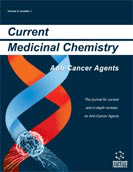Abstract
Over the past two decades, a number of chemical entities have been investigated in the continuing quest to reverse P-glycoprotein (PGP) mediated multidrug resistance (MDR) in cancer. The complexity of interactions between these agents and the proteins responsible for MDR in conjunction with the challenges associated with developing SAR / QSAR relationships for MDR modulators has hampered our ability to develop agents that modulate MDR with enhanced specificity of target, increased efficacy, and minimized toxicity when coadministered with anticancer drugs. With an increased understanding of the molecular interaction, target-mediated SAR and combinatorial chemistry approaches, newer more selective inhibitors have been recently reported. These agents have shown remarkable promise in preclinical trials although their ultimate clinical therapeutic utility remains to be established. The emphasis of this review is placed on the current understanding of modulator-drug transport protein interactions and to review the advances in the structure-based design, synthetic efforts and the cellular pharmacology of MDR modulating activity of a number of known PGP inhibitors.
Keywords: p glycoprotein pgp, multidrug resistance mdr, chemosensitizers, mdr modulators, sar qsar, mdr reversing agents, cellular pharmacology, atp binding cassette, glutathione s transferase
 3
3

















